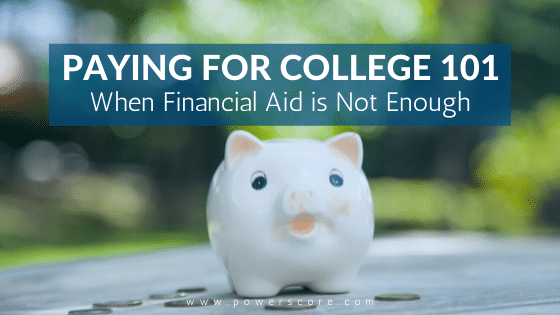One of the most stressful parts of college admissions is figuring out how to pay for the next four years. The process alone is daunting: you must fill out pages of forms and applications, complete the FAFSA and CSS PROFILE, submit tax returns for both you and your parents, and get everything sent off and certified. Even after all that, many students still don’t get enough financial aid to be able to afford college. They go through a blissful moment of “HOORAY!“ followed by the panic of “Oh, no!” when they realize they got into their top-choice school, but they may still not be able to go due to the cost of higher education. So what can you do when a college has unrealistic expectations for your family contribution?
You can always ask for a review of your financial aid package. Many colleges are amenable to looking over the financial aid they have put together for you, and see if there is anywhere where a change can be made, or where more money can be found.
Remember, though: Although asking for a review of your financial aid package is okay, there is a certain way that you should do it, and there are things you need to avoid. Here’s a list of the major DOs and DON’Ts when it comes to asking for more financial aid for college:
What to Do
- Wait until you’ve received all aid offers from every school to which you’ve been accepted. You want to be able to compare awards, and have an idea of what each school is offering you.
- Be nice, courteous, and professional. This should go without saying; the nicer you are, the more willing people will be to help you.
- Explain why more financial aid is necessary. Be ready to show schools that there is an actual reason why you’re making your request.
- Have evidence to back up your request (i.e., a better package from a similarly-ranked school, proof of recent financial hardship, etc). Don’t make your request in a vacuum!
- Explain how much you can realistically afford. Let them know that you’re willing to shoulder some of the financial burden.
- Consider work-study programs. This can help you eliminate some of the cost of attendance, and will give you good work experience besides.
- Have realistic expectations (i.e., don’t think that a $5,000 scholarship will turn in a $15,000 scholarship). There is only so much a school can do.
- Have a back-up plan in case your request doesn’t pan out. It may not always turn out the way you want—be prepared with back-up schools with more attractive financial aid offers.
What to Avoid
- Make demands. Remember, the school is actually helping you out—keep it friendly, and realize that you’re both on the same side.
- Make threats. “If you don’t do this, I’ll go to another school!” is not the way to get people to help you.
- Harass the school once they have given you their final decision on your request. Even if it’s well-meaning, continuing to ask the school for further consideration is more likely to frustrate them rather than help your case.
- Wait until the last minute to start the review process. Give the school plenty of time to see what they can do.
- Expect or demand merit aid if your stats are average or below average for the school. Merit aid is reserved for those with exceptional credentials—be realistic about yours, and be willing to accept that the school makes merit determinations on its own.
- Expect that you will avoid loans or work-study. When you ask for more aid, it is very likely that loans and work-study will be a part of it. If you are unwilling to accept this, it will make it very hard for the school to help you.
Getting your financial aid settled can be a stressful experience, but it doesn’t have to be! Just in keep in mind that you can always request a review of your financial aid package, and you’ll give yourself some needed peace of mind.


Leave a Reply
You must be logged in to post a comment.